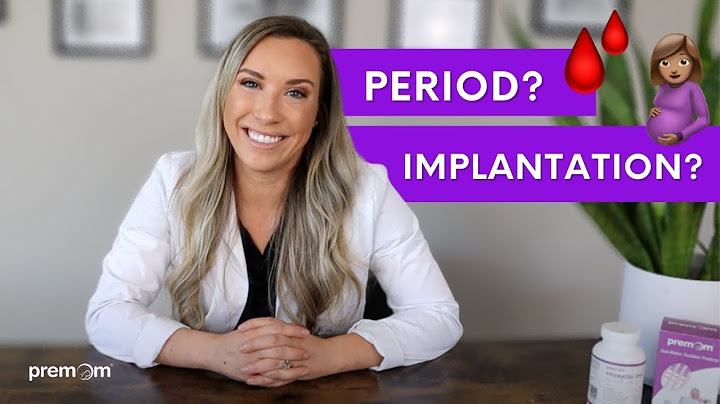If you have any bleeding during your pregnancy, with or without pain, it’s very important to get it checked out. It’s common to have light bleeding or ‘spotting’ without pain before 12 weeks. This isn’t often serious, but you should contact your doctor, midwife or
Early Pregnancy Unit immediately to be checked, just in case. Bleeding in pregnancy after 12 weeks is not common. Contact A&E or your hospital maternity unit immediately so you can be checked. Light bleeding or spotting can happen in the
first trimester (first 12 weeks of pregnancy) for a few reasons. Implantation is when the fertilised egg (developing embryo) is embedding into the wall of the womb. This usually happens around the time your period would normally have been due. Some women have had implantation bleeding after 8 weeks of pregnancy. An
implantation bleed is very light bleeding (spotting) that is usually pinkish and sometimes brown. You may see it when you wipe after going to the toilet or in your underwear. It shouldn’t be enough to soak through pads or underwear. Usually it only lasts for a day or so, though for some women it can last a little longer. Pregnancy hormones can cause changes to the cervix, which can sometimes cause bleeding. The cervix gets an increased blood supply and
becomes softer. This can cause some bleeding after sex (known as post-coital bleeding). Occasionally, vaginal bleeding can also be caused by an infection. Bleeding can sometimes be a sign of something more serious. Try to remember that many women who have bleeding in early pregnancy (before
12 weeks) go on to have a successful pregnancy. Just make sure that your symptoms are checked. MiscarriageA miscarriage is when a pregnancy ends before 24 weeks. Symptoms can include:
Some women may experience a 'threatened miscarriage'. This is diagnosed where there is ongoing bleeding with or without pain but the woman is still pregnant. Ectopic pregnancyAn ectopic pregnancy is when a fertilised egg implants outside the womb, usually in the fallopian tube. Symptoms can include:
Molar pregnancyA molar pregnancy is when a foetus doesn't form properly in the womb and a baby doesn't develop. Symptoms can include:
What are the causes of bleeding in late pregnancy (after 24 weeks)?Some women may experience a light bleed later on in their pregnancy. This is may not be from inside the womb, but from the cervix, for example, which can cause bleeding after sex. This may settle and doesn't necessarily mean there is a problem, but you should contact the hospital maternity unit immediately so you can be checked, just in case. There are two more serious causes of bleeding in late pregnancy: Low-lying placenta (placenta praevia)The area where the placenta is attached usually stretches upwards away from your cervix. A low lying placenta is when the placenta stays low in your womb, near to or covering your cervix. This may block the baby’s way out. In most cases, this would have been seen at one of your routine ultrasound scans and you will have an extra scan later in your pregnancy to see if the placenta has moved up. If the placenta is still low in your womb you may blead heavily during your pregnancy and your baby’s birth. This can put you and your baby at risk. If you have a low lying placenta and you have bleeding you may need emergency treatment – call 999. You’re more likely to need a caesarean section if you have a low-lying placenta. Placental abruption (abruptio placentea)This is a serious condition in which the placenta starts to come away from the womb wall. It usually causes extreme stomach pain which does not come and go like contractions. It may occur even if there is no bleeding. Contact your hospital maternity unit immediately if you are bleeding in late pregnancy. Find out more about placental abruption. Rhesus negativeDuring your antenatal care your midwife will find out your blood group and whether you have rhesus positive or negative blood. Knowing which group you are in is important. If you have rhesus negative blood, but your partner has rhesus positive blood, your baby has a chance of having rhesus positive blood too. If this happens, your body might see your baby’s blood as different to yours and develop antibodies. These antibodies can pass across the placenta and attack your baby’s blood cells. This won’t normally affect your first pregnancy, but it can be very serious in later pregnancies. Because of this, if you have rhesus negative blood your midwife will offer you an injection called anti-D during your pregnancy to protect your baby. If you have any bleeding or trauma to your bump (for example, if you fall over) contact your midwife or hospital maternity unit immediately. You may need to be checked and possibly have another injection of anti-D. Talk to your midwife if you have any questions about your and your baby’s blood type. Where should I seek help for bleeding in pregnancy?Any bleeding in pregnancy should be investigated even if you are not experiencing any other symptoms. It is important to make contact with a health professional to be seen as soon as possible. Before 12 weeks pregnantIf you feel generally well and the bleeding is not heavy, then you can call your GP or midwife (if you have one yet) for an appointment who can then assess if they need to refer to the local Early Pregnancy Unit. Sometimes, you can self-refer to a local Early Pregnancy Unit depending on your history and where you live. If you call your local GP surgery they should be able to advise you. You can also call NHS 111 if you feel you need urgent medical help but it is not an emergency. Go to your local A&E if you are experiencing bleeding and:
After 12 weeks pregnantGo to your local A&E or contact the hospital maternity unit immediately so you can be checked, just in case. Bleeding in pregnancy when you have had a previous miscarriageIf you have bleeding in your current pregnancy after one or more previous miscarriages, recent research has shown that progesterone can be beneficial. This research was published in 2019 and showed that the more previous miscarriages you had, the greater the benefit from progesterone treatment. Progesterone is a hormone that helps thicken the lining of the womb and the mother’s body to accept the growing baby. It is given as pessaries (tablets) and taken twice daily in the vagina (like inserting a tampon). The study that showed that progesterone can be an effective treatment was a large, multi-centre, randomised controlled trial, which is the gold standard of research trials. Talk to your doctorIf you have early pregnancy bleeding and a history of a previous miscarriage, progesterone treatment can be of benefit. As this research is relatively recent, your doctor may not have heard of it, so please discuss this treatment with your GP or the doctors at your local Early Pregnancy Unit. If necessary, show them this information or or download this leaflet and take it with you. Read more about the Prism trial. Review datesReviewed: 11 October 2018 | Next review: 11 October 2021 This content is currently being reviewed by our team. Updated information will be coming soon. How much bleeding is normal in early pregnancy?Implantation bleeding
“It happens between 6 and 12 days after conception as the fertilized egg implants into your uterus,” Dr. Heber says. This bleeding is typically light and may last for a few days.
Is spotting normal during the first 4 weeks of pregnancy?Your Body. The embryo continues to implant in your uterus, burying itself deep within the endometrium. Some women have slight cramping and spotting during this week while implantation happens. They might mistake this for a period, especially because this is around the time their monthly period was due.
Can you bleed when you are 4 weeks pregnant?Hormonal bleeding is when some women experience a light bleed at around four to eight weeks of pregnancy, or around the time their period would have been due. This can be very confusing for women who are pregnant and is the reason many women do not realise they are pregnant for a while. Again, it is totally normal.
Can you bleed at 5 weeks and still be pregnant?Light amounts of vaginal bleeding early in your pregnancy can occur. In most cases, it's not serious. It can happen in the first 20 weeks for different reasons. It can be the result of something serious or non-serious.
|

Related Posts
Advertising
LATEST NEWS
Advertising
Populer
Advertising
About

Copyright © 2024 ihoctot Inc.


















